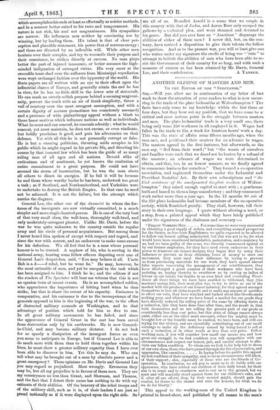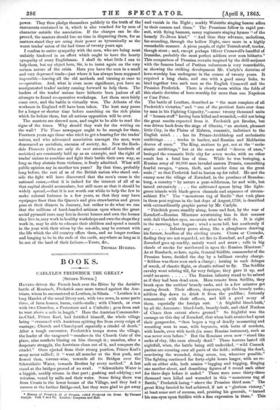ANOTHER GLIMPSE OF MASTERS AND MEN. To THE EDITOR OF
THE " SPECTATOR." SI11,-Will you allow me in continuation of my letter of last week to draw the attention of your readers to what is now occur- ring in the trade of the plate locksmiths at Wolverhampton ? The facts have only come to my knowledge within the last three or four days, but they bear out my position, that we have come to a' critical and most serious point in the struggle between masters and men. The plate locksmiths' trade is a very small one, there being only some 250 workmen in all employed in it. Wages had fallen in the trade to 15s. a week for fourteen hours' work a day.
This was the state of affairs sonic fifteen months ago, when the men met, and petitioned their masters for an advance in wages.
The masters agreed in the first instance, but afterwards, as the men say, " fled from their word ;" but " the wants of ourselves and families were such that we dared not be beaten by a refusal of the masters ; an advance of wages we were determined to obtain, and that, too, in an honest manner, so we finally agreed to commence business for ourselves." They formed a co-operative association, and registered themselves under the Industrial and Provident Societies' Act. By their own subscriptions and " the kind assistance of the amalgamated tin-plate workers of Wolver- hampton" they raised enough capital to start with ; a gentleman built and leased to them a large manufactory ; and they commenced work rather more than a year ago. In the 12 months 80 out of the 250 plate locksmiths had become members of the co-operative society, which flourished greatly. They shall, however, tell their story in their own language. I quote without altering a word, or a stop, from a printed appeal which they have lately published under the signatures of the chairman and secretary :—
"FELLOW WORKING MEN For some time we were very successful in obtaining a good supply of orders, and everything seemed prosperous for the future, as free-born Englishmen we quite expected to be allowed to follow our honest calling unmolested, but this was not to be, for what would have been considered intimidation, molestation, and conspiracy by us, had we been guilty of the sane, was directly commenced against us by our former employers, for they have used every endeavour in their power to frustrate our honest designs, they began first by using their influence to prevent us from obtaining loans of money to start our movement, they next used their influence by trying to prevent us from purchasing materials for our work, they have spread abroad false reports concerning the management of our establishment, they have discharged a great number of their workmen who have been assisting us, hoping thereby to overthrow us by casting an influx of labour on our hands, but thanks to an ever kind and overruling Provi- dence all these things we have been enabled to withstand, they (the masters) seeing this, their next plan was to try to drive us out of the market with the produce of our honest industry, for they agreed amongst themselves to lose all claim to profit and to make any amount of sacrifice to effect our ruin, they have watched and lurked about like bloodhounds seeking prey, and wherever we have found a market for our goods they have directly reduced the selling price of the same by offering theirs at a reduction, this they have done time after time, and the result is, that both themselves and us are selling the greater part of our goods at considerably less than cost price, but this state of things cannot always exist, either one or the other must succumb, either the mighty must be brought low or the humble must be exalted, we have been, and still are trying for the victory, and are cheerfully contributing out of our small earnings to make up the deficiency caused by being forced to sell at such a reduction, or in other words at less than cost price. Fellow working men, if you will consider how small our means are, and how great our struggle is, we feel confident you will sympathise with our circumstances and respect our honest, just, and careful attempt to alle- viate our fallen condition. To whom can we look to for help but to those of our own class, those who have passed through the fire of persecution, and oppression, like ourselves In laying before the public this appeal we feel confident of their sympathy, and, as fares circumstances will allow, of their support ; also, especially of those who are the friends of Co- operation. In conclusion, we ask you to assist us to do battle with our oppressors, who have robbed our children of their daily bread, for their aim is to crush and to overthrow and to cast us to the ground, but we must and will manfully stand against them for our children's sake, and if, after all our efforts, they, by their monied might, should gain the combat, let theirs be the shame and ours the honour, for what we do we do for liberty."
This appeal to the working-men of the United Kingdom is printed in broad-sheet, and published by all means in the men's
power. They thus pledge themselves publicly to the truth of the statements contained in it, which is also vouched for by men of character outside the association. If the charges can be dis- proved, the masters should lose no time in disproving them, for as matters stand they are using their power as tyrannically as the worst trades' union of the bad times of twenty years ago.
I confess to entire sympathy with the men, who are being most unfairly hindered in an effort which ought to have the hearty sympathy of every Englishman. I shall do what little I can to help them, but my object here, Sir, is to insist again on the very serious nature of the crisis. Here you have the men in a small and very depressed trade—just where it has always been supposed impossible—leaving all the old methods and turning at once to co-operation. And, what is even more significant, you have an amalgamated trades' society coming forward to help them. The leaders of the trades' unions have hitherto been jealous of all attempts to found co-operative workshops. Let them once fairly come over, and the battle is virtually won. The Atlanta of the workmen in England will have been taken. The host may pause for a longer or shorter time before marching on the rich plains which lie before them, but all serious opposition will be over.
The masters are shrewd men, and ought to be able to read the signs of the times. Why should they wait for the writing on the wall? The Times newspaper ought to be enough for them. Fourteen years ago those who tried to get a hearing for the trades' unions, and who advocated association amongst the men, were denounced as socialists, enemies of society, &c. Now the Roch- dale Pioneers (who are only the most successful of hundreds of societies) are constantly held up as an example, and the right of trades' unions to combine and fight their battle their own way, so long as they abstain from violence, is freely admitted. What will public opinion say in another ten years? By that time, probably long before, the rest of us of the British nation who stand out- side the fight will have discovered that the men's cause is the national cause,—that it is indeed for the interest of all of us that capital should accumulate, but still more so that it should be widely spread,--that it is not worth our while to help the few to make colossal fortunes in a few years, so that they may have equipages finer than the Queen's and give strawberries and green peas at their dinners in January, but rather to do what we can that the millions of hard-handed artizans upon whom the great social pyramid rests may live in decent houses and own the houses they live in, may work in healthy workshops and own the shops they work in, may be able to educate their children and spend a month in the year with their wives by the sea-side, may be content with the life which the old country offers them, and no longer restless and longing to be in the ends of the earth, anywhere so long as it be out of the land of their fathers.—Yours, &c.,
THOMAS HUGHES.































 Previous page
Previous page